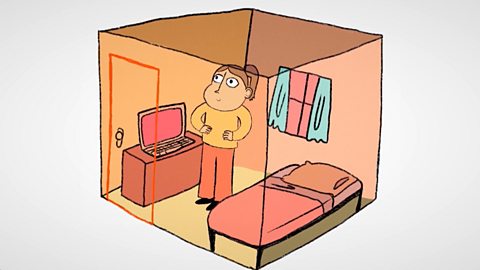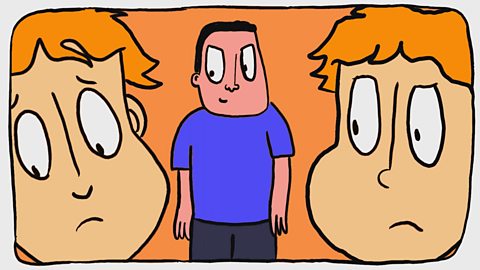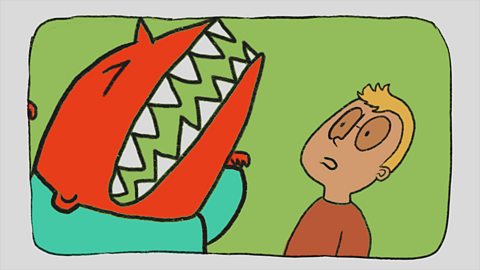This film discusses being a young carer for a parent, and we advise that a teacher watches the film before showing it to pupils.
LLIO: It's not easy being Dad's carer. And I'm still not sure what's the matter with him. When he came out of hospital, he just said, "It'll be fine, Llio. You'll see." But he can't move like he used to. He just sits down all day. So I do the cleaning, I wash the clothes and cook all the food. I'm really tired when the alarm goes off at six in the morning, but I've got to hoover, and then I make Dad's breakfast before I go to school.
POET: Ten years old,
looking after a sick parent.
That must be a strain
But what are you meant to do
when you see your dad in pain?
LLIO: I think Dad's physical illness affects his emotional health, too. I've tried talking to him. He just says he's getting better. But I know it's not true.
POET: You're helpless at what to do
or who you can turn to.
No, you are not alone.
There's help at the end of a phone
All across Wales, there are
thousands of young people,
young carers just like you.
They're also torn, trying
to figure out what best to do.
LLIO: I've seen some names and phone numbers I can call on Miss Williams's door.
POET: There is help on hand.
All you have to do is ask.
LLIO: One morning, I had a chat with Miss Williams. She told me there's this group for young people just like me and you can chat with other carers. She gave me a pamphlet, but I had to hide it in my bag. I didn't want Dad to see it. I just don't want to upset him.
POET: Yeah, Dad may be annoyed,
but it's better than making out
everything is fine when it's not.
Ease the pressure that's built up
from bottling it up
as it gets too tough,
or carry on the way you are.
But something has to give,
and surely this has gone too far.
LLIO: I have decided to call the number.
WOMAN: Hello. Young Carers Helpline.
Summary of the film
Llio is ten years old and cares for her father who is poorly. She gets up early to wash the clothes, clean the house and make breakfast for him before school. She gets so tired and there aren’t many opportunities to go out and have fun with her friends. Will Llio decide to receive help?
Teacher notes
Ideas for the classroom:
Llio’s life jigsaw – Each group could research into information about what is means to be a ‘young carer’. They could either be encouraged to research online or the teacher could provide written articles or information sheets and pupils could be asked to read and interpret the information to find out:
- What does it mean to be a young carer?
- What is a young carer’s responsibilities?
- What challenges does a young carer face?
- What support is available to young carers?
After completing this task, pupils could be asked to respond creatively by creating a ‘jig-saw’ of Llio’s life. This could mean that each member of the group crates an image representing an element of Llio’s life using shapes like the below, in order to create a full picture.
- Children’s rights - A session could be held on children’s rights in Wales asking pupils to discuss what is the meaning of having a ‘right’ and move on to looking at children’s rights in Wales.
As a creative task, pupils could be asked to create picture cards based on ‘I have the right to…’ where they draw images to coincide with different rights to reflect the different rights that children have in Wales.
The poem discusses the fact that Llio’s dad struggles with his feelings, as well as his physical illness – the image of his brain full of complex shapes in the film could be used to discuss feelings and mental health.
- How would he feel?
- What can Llio do to help?
- Have the pupils felt alone before?
They could form a mind map to brainstorm.
Language, literacy and communication ideas:
- Group activity - How does a 10 year old’s life look? How does Llio’s life differ? Pupils could create a mind map using two separate colours to reflect the differences. How would they feel if they were Llio?
This could later be used as a prompt to ask pupils to write a diary about ‘a day in the life of a young carer’, or a day in Llio’s life. Pupils could be encouraged to research into facts about young carers in Wales to create mind maps with useful information, or they could use the information they collected in the ‘Llio’s life jig-saw’ task.
This guide on writing a diary could be useful for this task.
- Role play activity - pupil 1: Llio, pupil 2: person giving help, pupil 3: dad. This could be a brief activity after watching the film to see how much pupils have understood from the film.
After this, pupils could be asked to write a poem from the perspective of the person they played.
- Teachers could discuss feeling alone with pupils, relating back to Llio’s character and how she feels in the film. In pairs, one pupil could think of periods in their life when they have felt alone, and the other could think of strategies to cope with those feelings. They could then be asked to write their own poems or diaries on feeling alone, in the style of the narrator in the poem, eg as a rap and using rhetorical questions.
Learning outcomes and curriculum notes
- Learn about the context of being a young carer in Wales
- Develop understanding about feeling under pressure – keeping things secret, the future, something happening to a member of the family
- Learn more about the importance of sharing concerns
Area of Learning and Experience – Health and Well-being
How we process and respond to our experiences affects our mental health and emotional well-being.
Progression Step 3
I can see the benefits of communicating about feelings as one of a range of strategies which can help promote positive mental health and emotional well-being.
I can ask for help when I need it from people I trust.
I can anticipate how future events may make me and others feel.
I can empathise with others.
I can understand how and why experiences affect me and others.
Area of Learning and Experience – Humanities
Informed, self-aware citizens engage with challenges and opportunities that face humanity, and are able to take considered and ethical action.
Progression Step 2
- I am beginning to understand what human rights are and why they are important.
Area of Learning and Experience – Expressive Arts
Creating combines skills and knowledge, drawing on the senses, inspiration and imagination.
Progression Step 2
- I can communicate ideas, feelings and memories for an audience and for purposes and outcomes in my creative work.
Where next?
Tegan’s story. video
Tegan shuts herself away from the real world, and finds comfort in playing computer games in her bedroom. Will she find the strength to step out of this world?

Trystan and Macs' story. video
Trystan and his brother Macs are being bullied in school, but don't tell anyone. Will they let the bullys get the better of them, or decided to talk to someone?

Tyler’s story. video
Tyler gets angry at the smallest thing and loses his temper easily. Will he be able to control his anger and talk about his emotions?


